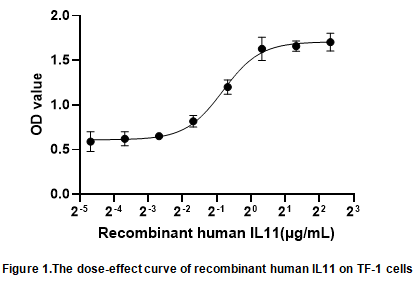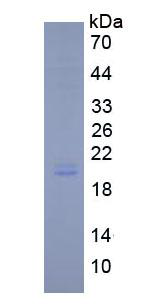Active Interleukin 11 (IL11) 

AGIF; Adipogenesis Inhibitory Factor; Oprelvekin
- UOM
- FOB US$ 328.00 US$ 821.00 US$ 1,642.00 US$ 4,926.00 US$ 12,315.00
- Quantity
Overview
Properties
- Product No.APA057Hu61
- Organism SpeciesHomo sapiens (Human) Same name, Different species.
- ApplicationsCell culture; Activity Assays.
Research use only - DownloadInstruction Manual
- CategoryCytokineInfection immunityRheumatology
- Buffer FormulationPBS, pH7.4, containing 5% Trehalose.
- Traits Freeze-dried powder, Purity > 95%
- Isoelectric Point11.7
Sign into your account
Share a new citation as an author
Upload your experimental result
Review

Contact us
Please fill in the blank.
Activity test

Interleukin 11 (IL-11) is a multifunctional cytokine. It is a key regulator of multiple events in hematopoiesis, most notably the stimulation of megakaryocyte maturation. IL-11 has been demonstrated to improve platelet recovery after chemotherapy-induced thrombocytopenia, induce acute phase proteins, modulate antigen-antibody responses and participate in the regulation of bone cell proliferation and differentiation. Besides, IL-11 has been proved to promote cell proliferation of TF-1 cells. 2x104 TF-1 cells were seeded into a well of 96-well plates and allowed to attach, replaced with various concentrations of recombinant human TRAIL. After incubated for 72 hours, the 96-well plate was read at OD450 nm. The result was shown in Figure1. It was obvious that recombinant IL-11 protein significantly increased cell viability of TF-1 cells. Its EC50 is 0.5677μg/mL.
Usage
Reconstitute in 10mM PBS (pH7.4) to a concentration of 0.1-1.0 mg/mL. Do not vortex.
Storage
Avoid repeated freeze/thaw cycles. Store at 2-8°C for one month. Aliquot and store at -80°C for 12 months.
Stability
The thermal stability is described by the loss rate. The loss rate was determined by accelerated thermal degradation test, that is, incubate the protein at 37°C for 48h, and no obvious degradation and precipitation were observed. The loss rate is less than 5% within the expiration date under appropriate storage condition.
Increment services
-
 BCA Protein Quantification Kit
BCA Protein Quantification Kit
-
 Molecular Mass Marker for Protein
Molecular Mass Marker for Protein
-
 Monoclonal Antibody Customized Service
Monoclonal Antibody Customized Service
-
 Polyclonal Antibody Customized Service
Polyclonal Antibody Customized Service
-
 Protein Activity Test Experiment Service
Protein Activity Test Experiment Service
-
 Electrophoretic Mobility Shift Assay (EMSA) Experiment Service
Electrophoretic Mobility Shift Assay (EMSA) Experiment Service
-
 Buffer
Buffer
-
 Lentivirus Packaging Experiment Service
Lentivirus Packaging Experiment Service
-
 Adenovirus Packaging Experiment Service
Adenovirus Packaging Experiment Service
-
 Real Time PCR Experimental Service
Real Time PCR Experimental Service
-
 Spike RBD Protein (S-RBD)
Spike RBD Protein (S-RBD)
-
 Protein G
Protein G
-
 Protein A
Protein A
Citations
- Regulatory effect of chemerin and therapeutic efficacy of chemerin‑9 in pancreatogenic diabetes mellitusPubmed: 31922216








